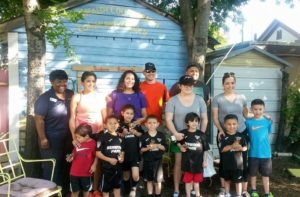“Everything that’s done collaboratively, in the end, is worthwhile—is worth doing,” Pilar Oates says. “Just by nature of who we are, everything we do is deliberate. It can be painful, but we do keep trudging along until we get there.”
For more than twenty years, the Bexar County Community Health Collaborative has joined the forces of caregivers and community organizations to conduct county-wide health needs assessments—a project that now serves as a catalyst for more extensive, action-based programming.
Data collected in each assessment presents the Health Collaborative with opportunities for diverse stakeholder engagement, bringing to the table resources, talents and skills that can be leveraged for initiatives like the Community Health Improvement Plan, a strategic plan formulated in partnership with the local health department.
In this week’s episode of Into the Fold, executive director Elizabeth Lutz and board members Pilar Oates and Bob Ferrar talk about the ins and outs of collaborative work. Their conversation oscillates between the core of the Health Collaborative’s operations and the outskirts of its impact—always circling back to the community members they serve.
Moving Forward for the Greater Good
The Health Collaborative’s flexible structure lends itself to an assortment of facilitative and supervisory functions. “The [Health] Collaborative has been called upon to serve as a capacity builder, a community engager, a facilitator of conversations—all in an effort to ensure that we’re moving along in a similar direction,” Lutz says.
A total of 18 agency and community leaders, supported by a broader cluster of community organizations and coalitions, power the Health Collaborative’s operational engine. “The work of the Health Collaborative is really organically moved by our community partners,” Lutz says. “We’re able to adapt to the needs of our stakeholders and partners here locally.”
Although much common ground—in terms of interests and objectives—exists for partners to hold and navigate in unison, conflict and compromise are inevitable. “Collaboration is not for the faint of heart,” Oates says. “Collaboration means putting aside your personal agenda and having discussions about the greater good. It’s not something that happens overnight.”
Accommodating room for disagreement, however, doesn’t necessarily mean sacrificing momentum. Oates continues, “I think the highest thing you can say about a good collaborative is, let’s agree to disagree, but let’s agree to move forward at the end of the day.”
Trust, Transparency and Time Yield Results
For collaborative work to be truly effective, partners must remain candid about their own strengths and weaknesses. “Collaboration begins with trust and transparency,” Lutz says. “Knowing what your challenge is, and knowing what your capacity is and being honest about that.”
Discussions also become more constructive when partners dedicate the time and space needed to reach a mutually beneficial consensus. “It takes patience to work through that and really make sure you understand what it is you’re talking about,” Ferrar says. “What benefits might come out the other hand, and who it is that should participate.”
The spirit of generosity and clarity maintained by the Health Collaborative’s partners paves the way for projects like the Pathways Community HUB, which aims to address social determinants in vulnerable populations.
“The HUB is a way to collect people who need social services that goes way beyond the usual modus operandi,” Ferrar says. Its tripartite network constitutes a secure information system that matches individuals with service providers, community health workers that facilitate the fruition of those connections and a payment mechanism triggered by successful outcomes.
The HUB’s functionality, like the Health Collective’s broader agenda, doesn’t come from agency input alone. “Anything you can see on our website as a potential product or output is done by our local community—is done with our local community,” Lutz says.
Related: Bexar County’s Collaborative Approach to Community Mental Health
Learn more about our podcast and check out other episodes!

